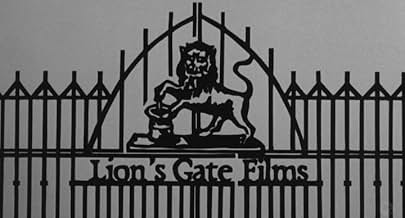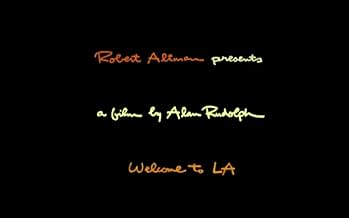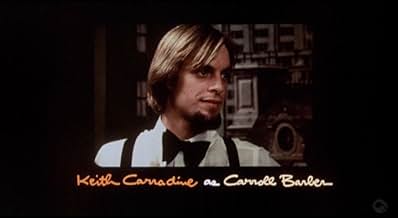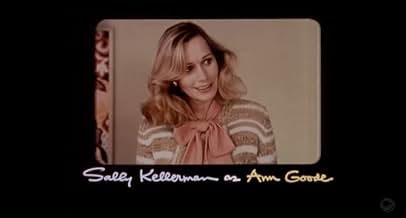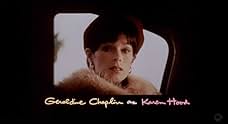IMDb RATING
5.8/10
1.2K
YOUR RATING
The lives and romantic entanglements of a group of young adults who have achieved "overnight" success in Los Angeles.The lives and romantic entanglements of a group of young adults who have achieved "overnight" success in Los Angeles.The lives and romantic entanglements of a group of young adults who have achieved "overnight" success in Los Angeles.
- Nominated for 1 BAFTA Award
- 1 nomination total
Mike Kaplan
- Russell Linden
- (as Mike E. Kaplan)
Ron Silver
- Massuese
- (uncredited)
- Director
- Writer
- All cast & crew
- Production, box office & more at IMDbPro
Featured reviews
Despite a fabulous cast led by Alan Rudolph regular Keith Carradine, this vacant, flat movie with virtually no plot is easy to classify as a lesser "Nashville" set on the West Coast. I mean, what are the major happenings, Denver Pyle makes Harvey Keitel a partner? Uh . . . that was about it, there's a party.
So, why the heck do I like this so much? I've seen it maybe 30 times, even though it's unavailable on any media, at the moment, at least, and every time I watch it all the way through to the last shot of Carridine looking sideways at the camera. I saw it when it first came out, and it stayed in my mind for decades until it started to show up on the movie channels. I can't explain it, the music is nice (particularly "One Night Stands" and "Welcome to L.A."), but the conversation isn't particularly clever (compare "Choose Me" for example). I can't really defend the film, how could I? There's no message, no plot, no outstanding performances to champion . . . I don't know, I just enjoy watching it. Beats me.
So, why the heck do I like this so much? I've seen it maybe 30 times, even though it's unavailable on any media, at the moment, at least, and every time I watch it all the way through to the last shot of Carridine looking sideways at the camera. I saw it when it first came out, and it stayed in my mind for decades until it started to show up on the movie channels. I can't explain it, the music is nice (particularly "One Night Stands" and "Welcome to L.A."), but the conversation isn't particularly clever (compare "Choose Me" for example). I can't really defend the film, how could I? There's no message, no plot, no outstanding performances to champion . . . I don't know, I just enjoy watching it. Beats me.
It seemed a bit dark in '77, but today it may even cheer you up! It takes at least a half-hour to understand what's going on in this movie so here's a head start:
The guy with the hat and goatee (Carroll) is a song-writer/playboy and son of a millionaire. Watch him because he wants to sleep with most of the women in the movie. The crazy woman in the taxi is married to... is that really Harvey Keitel? Yes. You'll never believe it! He is the employee of the millionaire who is, incidentally, Uncle Jessie from the Dukes of Hazard.
If I were Carroll I would have gone for Sissy Spacek, who likes to clean house topless throughout the movie. But he still makes enough tracks to be considered a hero of the sexual revolution.
The music throughout the movie sounds a little like Dan Hill, but it gets you in a good 70's mood so that you can enjoy the atmosphere this movie creates. Look for Sissy Spacek's pants that match the wallpaper and definitely check out Harvey Keitel's pipe!
The guy with the hat and goatee (Carroll) is a song-writer/playboy and son of a millionaire. Watch him because he wants to sleep with most of the women in the movie. The crazy woman in the taxi is married to... is that really Harvey Keitel? Yes. You'll never believe it! He is the employee of the millionaire who is, incidentally, Uncle Jessie from the Dukes of Hazard.
If I were Carroll I would have gone for Sissy Spacek, who likes to clean house topless throughout the movie. But he still makes enough tracks to be considered a hero of the sexual revolution.
The music throughout the movie sounds a little like Dan Hill, but it gets you in a good 70's mood so that you can enjoy the atmosphere this movie creates. Look for Sissy Spacek's pants that match the wallpaper and definitely check out Harvey Keitel's pipe!
When Karen Hood (Geraldine Chaplin) tells Carroll Barber (Keith Carradine) "I love Greta Garbo," he responds with the slightly cryptic "Yeah, she's nice when you're by yourself."
Profound, but too offhand to be a predictable rejoinder. It's very striking, one of the most original of the film.
Especially do you get the flavour of the upper-middle-class world-weary young disappointed in Baskin's lyric:
"At first I loved your sweet complexion, your tawny cheeks and lip confections--they photographed you for your style.
your body held me for a while; you could disguise with such beguile
now lying her remembering it better than it used to be is loneliness, but it doesn't really matter now, I never really loved you much, I guess."
That's from the title song.
From "The Best Temptation of all" there is "there's so many bodies and scenes...so many faces and feelings...dreams...wet tasting dreams
when those silky infatuations come, enticin' me...invitin' me..excitin' me.."
The world of "bodies and pleasures" that was Michel Foucault's vision of the future of sexuality in the first volume of THE HISTORY OF SEXUALITY was being lived out in L.A. in particular before he even wrote that it would come to this.
At a Malibu party where Carroll and his wealthy father Carl (marvelously played by Denver Pyle) confront each other, Carl's mistress Nona (Lauren Hutton) spends some stylized, posturing time with Carroll up the stairs overlooking the stylized party, the kind of party in stark white stylized modern LA houses where being comfortable must be impossible, and being controlled is an impossible necessity; and he says to her "Do you really care about that old man?" She says, knowing it won't do to say anything "less," "He sure seems to care a lot about me."
Earlier, before Carroll sees Susan (Viveca Lindfors) for the first time since his return, she says on the telephone "don't you want to see me?" and he says "I've seen you." As the older woman, somewhat desperately clinging to an unshared wish, she says "I've seen you too. I liked it."
To the love-and/or sex-starved real estate salesgirl Anne Goode (Sally Kellerman), Susan says, when she makes the arrangements for Carroll's apartment, "I pictured you plump and tiny with curly black hair--AGGRESSIVE. And here you are--soft and blonde and pretty." Anne, always trying to hard to please: "And here you are so beautiful."
Kellerman drives Carradine to his new Silverlake digs.
She says "this is Hollywood. I just love it. I don't know a thing about it, but I love it...(long pause)....does that sound like a line?...I didn't mean it to..I guess everything sounds like a line these days...Shameless, aren't I?...what are you thinking?....
Carradine: "About your shame."
************************************************************************
"People deceive themselves here, don't you think? Yes. And that's how they fall in love. And then, when everything is over, it's the other person that gets deceived. Am I right? Yeah. Van Nuys Boulevard...(long pause)..I don't need to be loved by anyone...I don't mind waiting...it's how you wait that's important, anyway..I think.. but everyone gets deceived...don't they..."
These are the opening lines of the film, which Chaplin intones in a cab going through L.A., riding all over it as she does every day, all dressed up in fur and pearl earrings and hat all for herself's own formality in the anonymity of a taxi ride.
I knew a number of people like this in 1976 and 1977. They were over-sophisticated and living in the strange limbo between the volatile, but vital 60's and the beginning of the carnage and sterization that began to open its fully tarnished flower with the Reagan era and has escalated to the deafening roar we have only 24 years later.
Bars were full of people who weren't on cellphones all the time.
They weren't ever on cell phones--even the ones you can still see.
Profound, but too offhand to be a predictable rejoinder. It's very striking, one of the most original of the film.
Especially do you get the flavour of the upper-middle-class world-weary young disappointed in Baskin's lyric:
"At first I loved your sweet complexion, your tawny cheeks and lip confections--they photographed you for your style.
your body held me for a while; you could disguise with such beguile
now lying her remembering it better than it used to be is loneliness, but it doesn't really matter now, I never really loved you much, I guess."
That's from the title song.
From "The Best Temptation of all" there is "there's so many bodies and scenes...so many faces and feelings...dreams...wet tasting dreams
when those silky infatuations come, enticin' me...invitin' me..excitin' me.."
The world of "bodies and pleasures" that was Michel Foucault's vision of the future of sexuality in the first volume of THE HISTORY OF SEXUALITY was being lived out in L.A. in particular before he even wrote that it would come to this.
At a Malibu party where Carroll and his wealthy father Carl (marvelously played by Denver Pyle) confront each other, Carl's mistress Nona (Lauren Hutton) spends some stylized, posturing time with Carroll up the stairs overlooking the stylized party, the kind of party in stark white stylized modern LA houses where being comfortable must be impossible, and being controlled is an impossible necessity; and he says to her "Do you really care about that old man?" She says, knowing it won't do to say anything "less," "He sure seems to care a lot about me."
Earlier, before Carroll sees Susan (Viveca Lindfors) for the first time since his return, she says on the telephone "don't you want to see me?" and he says "I've seen you." As the older woman, somewhat desperately clinging to an unshared wish, she says "I've seen you too. I liked it."
To the love-and/or sex-starved real estate salesgirl Anne Goode (Sally Kellerman), Susan says, when she makes the arrangements for Carroll's apartment, "I pictured you plump and tiny with curly black hair--AGGRESSIVE. And here you are--soft and blonde and pretty." Anne, always trying to hard to please: "And here you are so beautiful."
Kellerman drives Carradine to his new Silverlake digs.
She says "this is Hollywood. I just love it. I don't know a thing about it, but I love it...(long pause)....does that sound like a line?...I didn't mean it to..I guess everything sounds like a line these days...Shameless, aren't I?...what are you thinking?....
Carradine: "About your shame."
************************************************************************
"People deceive themselves here, don't you think? Yes. And that's how they fall in love. And then, when everything is over, it's the other person that gets deceived. Am I right? Yeah. Van Nuys Boulevard...(long pause)..I don't need to be loved by anyone...I don't mind waiting...it's how you wait that's important, anyway..I think.. but everyone gets deceived...don't they..."
These are the opening lines of the film, which Chaplin intones in a cab going through L.A., riding all over it as she does every day, all dressed up in fur and pearl earrings and hat all for herself's own formality in the anonymity of a taxi ride.
I knew a number of people like this in 1976 and 1977. They were over-sophisticated and living in the strange limbo between the volatile, but vital 60's and the beginning of the carnage and sterization that began to open its fully tarnished flower with the Reagan era and has escalated to the deafening roar we have only 24 years later.
Bars were full of people who weren't on cellphones all the time.
They weren't ever on cell phones--even the ones you can still see.
You can't help but compare it to the other big L.A. Statement Movies--Altman's SHORT CUTS, and P.T. Anderson's MAGNOLIA. I like Rudolph's way better than either of those: it's gentler, humbler, more observant, truer. Limiting himself to a dozen or so L.A. habitues, Rudolph starts with one funny, correct move: no movie people. The dances of disconnection, attempted connection, failed connection, and--stunning!--connection accomplished are as tender and as finely, thinly observed as Rudolph has ever pulled off. So many beautiful moments here: the best comes when Keith Carradine, as a dupe of his sleepy-stud character from NASHVILLE, breaks up a romance to go on a healing mission with a half-crazy housewife (Geraldine Chaplin). When his philandering with her rescues her marriage during a tense phone call in his apartment, Carradine's face spreads with gladness and relief. The rightness and the unexpectedness of the moment is fantastic. Even more than the goofy, enjoyably romantic CHOOSE ME, this is the one where Rudolph got it all right. And no other movie captures L.A.'s peculiar loneliness like this one: he doesn't hype anything or play to the tourist mentality--something that could not always be said for his mentor, and the movie's producer, Robert Altman.
If you saw this film when it came out, the cultural atmosphere would have no nostalgic impact on you, even if you lived in L.A., because it was obviously present day for you.
Which brings us to the main thing that so many of us like about the movie. We like to take in the clothes, cars, landscapes and musical vibe of a bygone era; one which we may have lived for and now long for. For younger people, there may be a fascination for the way part of the world was before they were born.
I was there in L.A. at that time. As a very wide-eyed and impressionable teenybobber, I was standing in the background watching the grown ups and the older kids living out their 70s lifestyle. I was just a tad too young to join. My favorite line in the film is "Daydreams and Traffic," uttered by Keith Carradine, repeating what his blonde real estate agent said L.A. is all about. I totally agree with that vibe. It's addictive in an odd sort of way.
Character development is vitally important to a film, and this one is short on it. For me, at some point, a character has to explain why they are the way there are. Or at least it must come out in related dialogue. It didn't here for the most part.
I say "for the most part," because we do at least see through couplings and facial expressions, and monlogues, that they are lonely people who are not getting the love and devotion they had hoped for from their life partners and families.
Yes, these are mostly shallow,self-indulgent losers, who characterize the worst aspects of their era and area. But it's o.k. to tell a story about losers, if they are the types you are familiar with. Like another reviewer, I too give the makers credit for not including movie people. That would be too easy and too clichéd.
I loved the Richard Baskin music. His slightly off-key delivery made it better than it would be if it were perfect. Songwriters are not necessarily supposed to be great singers. They sing their own stuff with true feeling however, since they know the ethos behind the music better than anyone else. Of course in this movie, maybe the Keith Carradine character was supposed to have written the music.
The nudity did nothing for me. The context was not sexy. I'm not a big fan of big boobs on a super skinny body. I like proportion.
Even though I am a conservative person, I do often wish I could have lived as an adult during a period when everyone was open to one night stands. I love the idea of bonding with a waitress and enjoying an evening together with no strings. I know that makes me a bit of a hypocrite.
I guess I envied the Carradine character's unearned millions, his cool house, his talent, and his ability to bed whomever he chose, whenever he chose. Enough said.
Which brings us to the main thing that so many of us like about the movie. We like to take in the clothes, cars, landscapes and musical vibe of a bygone era; one which we may have lived for and now long for. For younger people, there may be a fascination for the way part of the world was before they were born.
I was there in L.A. at that time. As a very wide-eyed and impressionable teenybobber, I was standing in the background watching the grown ups and the older kids living out their 70s lifestyle. I was just a tad too young to join. My favorite line in the film is "Daydreams and Traffic," uttered by Keith Carradine, repeating what his blonde real estate agent said L.A. is all about. I totally agree with that vibe. It's addictive in an odd sort of way.
Character development is vitally important to a film, and this one is short on it. For me, at some point, a character has to explain why they are the way there are. Or at least it must come out in related dialogue. It didn't here for the most part.
I say "for the most part," because we do at least see through couplings and facial expressions, and monlogues, that they are lonely people who are not getting the love and devotion they had hoped for from their life partners and families.
Yes, these are mostly shallow,self-indulgent losers, who characterize the worst aspects of their era and area. But it's o.k. to tell a story about losers, if they are the types you are familiar with. Like another reviewer, I too give the makers credit for not including movie people. That would be too easy and too clichéd.
I loved the Richard Baskin music. His slightly off-key delivery made it better than it would be if it were perfect. Songwriters are not necessarily supposed to be great singers. They sing their own stuff with true feeling however, since they know the ethos behind the music better than anyone else. Of course in this movie, maybe the Keith Carradine character was supposed to have written the music.
The nudity did nothing for me. The context was not sexy. I'm not a big fan of big boobs on a super skinny body. I like proportion.
Even though I am a conservative person, I do often wish I could have lived as an adult during a period when everyone was open to one night stands. I love the idea of bonding with a waitress and enjoying an evening together with no strings. I know that makes me a bit of a hypocrite.
I guess I envied the Carradine character's unearned millions, his cool house, his talent, and his ability to bed whomever he chose, whenever he chose. Enough said.
Did you know
- TriviaGeraldine Chaplin's first nude scene. "My nudity, which is total, has nothing erotic about it: it is part of the anguish of my character," she said.
- Crazy creditsIn the opening credits, the actors are credited with an accompanying still picture and their character name.
- ConnectionsFeatured in Z Channel: A Magnificent Obsession (2004)
- How long is Welcome to L.A.?Powered by Alexa
Details
- Release date
- Country of origin
- Language
- Also known as
- Willkommen in Los Angeles
- Filming locations
- Production company
- See more company credits at IMDbPro
Box office
- Budget
- $1,100,000 (estimated)
Contribute to this page
Suggest an edit or add missing content



